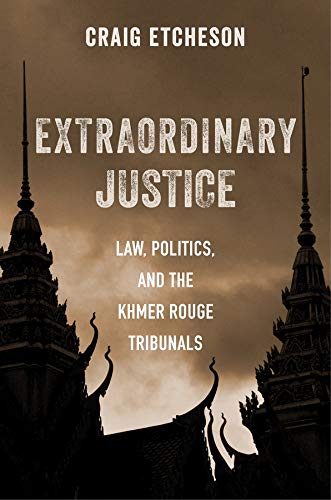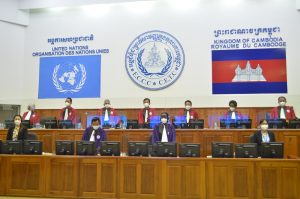After 15 years, $300 million, and convictions against three former leaders, Cambodia’s United Nations-backed Khmer Rouge tribunal, the Extraordinary Chambers in the Courts of Cambodia (ECCC), is finally nearing its end.
Few non-Cambodians have played a more prominent role in the push for justice and accountability in Cambodia than Craig Etcheson. As an academic in the 1980s, he served as the head of the Washington-based Committee to Oppose the Return of the Khmer Rouge, and later helped document the country’s dozens of “killing fields.” He then served as chief of investigations for the office of the prosecution at the ECCC from 2006 to 2012. Etcheson is also the author of several books on Cambodia, including, most recently, “Extraordinary Justice: Law, Politics, and the Khmer Rouge Tribunals” (Columbia University Press, 2019).
Etcheson, currently a visiting scientist at Harvard University’s T. H. Chan School of Public Health, spoke with The Diplomat about the politically complex origin of the court, the challenge of reconciling law and politics in international justice, and the possible legacies of the trials in Cambodia.
Your recent book documents in detail how the negotiations on the creation of the ECCC were forced to accommodate a range of incompatible legal, moral, and political interests. These included the rights and desires of victims, the United Nations’ concerns about the legitimacy of the legal process, the political interests of the major donor governments (including Japan, France, and the United States), and the Cambodian government’s desire for control over the process. What impacts did these compromises have on the structure of the court, its jurisdiction, and its subsequent proceedings? Do you think such compromises could have been avoided?
The negotiations that eventually resulted in the establishment of the ECCC consumed more than a decade, and as you rightly note, involved a large number of players, including victims’ groups, multiple organs of the U.N., many governments, inter-governmental and non-governmental organizations, and, last but not the least, the Royal Government of Cambodia (RGC). This menagerie of players brought to bear an absolutely withering array of interests, many of which were incompatible. As a result, many of those interests simply could not be accommodated.
The most important players, however, were the U.N., the U.S., and the RGC. The U.S. was the crucial interlocutor which was able, after a great deal of effort, to get the U.N. and the RGC to Yes. The U.N. was able to secure the majority of its demands, except for what was perhaps the single most important one: a majority of international judges who could not be outvoted by the national judges. The RGC obtained its single most important, albeit unstated, demand: the ability to block prosecutions with which it did not agree. Without that condition, the Cambodian government would not have allowed an internationalized court to be established in anything resembling its eventual form.
Whether an alternative model of an internationalized court could have been created and would have succeeded is a historical counterfactual whose likelihood is difficult to assess, but it seems highly doubtful to me. Consequently, many observers have argued – and I agree – that the ECCC, flawed though it is, was the last chance to bring the leadership of the Khmer Rouge to justice.
Alongside the ECCC’s achievements – particularly its convictions against three senior former Khmer Rouge in its Case 001 and Case 002 – there have been numerous complaints about the Cambodian government’s interference in the trial process, particularly in halting progress on two further cases (Case 003 and Case 004) involving lower-ranking Khmer Rouge. Briefly, how have Prime Minister Hun Sen and his government viewed the trials, and what considerations have influenced their approach toward it?
Hun Sen and his colleagues have always had a complicated and cautious view of the Khmer Rouge trials. From one perspective, Hun Sen has long claimed that he beat the Khmer Rouge militarily, he beat the Khmer Rouge politically, and with the trials presently all but completed, he can claim that he beat them legally. Now, however, the government appears to be shifting the narrative from one of retributive justice to one of a “win-win” restorative justice, wherein Hun Sen has achieved national reconciliation and unified the nation through his strength, wisdom, and benevolence. In Cambodia’s political culture, the meaning of “reconciliation” is that the strong will crush the weak, and then there will be peace.
Even so, the question of how to stabilize and rebuild a society that had been at war with itself for thirty years is extraordinarily complex and delicate. This is where Hun Sen’s benevolence comes in: he has not sought to crush the rank and file of his enemies, only to co-opt, marginalize, or if necessary, destroy their top leadership. For the “little people,” if they do not attempt to challenge his supremacy, then they are welcome to rejoin the national community. Once they do, they come under his protection, which we can see in the way that Cases 003 and 004 – which did not involve senior-level Khmer Rouge leadership – have unfolded at the ECCC.
 Do you think it possible to isolate the law from politics in internationalized courts like the ECCC, as the United Nations and some human rights advocates sought during the negotiations over the court’s founding?
Do you think it possible to isolate the law from politics in internationalized courts like the ECCC, as the United Nations and some human rights advocates sought during the negotiations over the court’s founding?
One needs to distinguish between the creation of such courts, on the one hand, and the internal decision-making of the courts, on the other. I expect that organizations such as the United Nations and Human Rights Watch will always attempt to isolate the law from politics in internationalized courts, and to the extent that they can succeed in insulating the judicial deliberations of a court from political influences, it is a worthy goal to pursue. In some instances that will turn out to be possible – for example, at the Extraordinary African Chambers in Senegal – while in others – for example, currently at the Special Criminal Court in the Central African Republic, or at the ECCC – it will not. But the decisions about when and where to establish internationalized courts, who to prosecute at those courts, and what happens in the aftermath of the judicial proceedings, will always be fundamentally political decisions.
Given all of the various ways in which political considerations shaped the ECCC’s structure and jurisdiction, can we view the resulting proceedings as “legitimate”?
It is inevitable that political considerations will shape an internationalized court’s structure and jurisdiction; the real concern is with how much politics shapes the judicial proceedings themselves. Accordingly, many if not most observers are likely to deliver a mixed verdict on the question of whether or not the proceedings of the ECCC are/were legitimate. It appears to me that most legal observers do indeed regard the conduct and outcome of Cases 001 and 002 as legitimate, considering the care with which those cases were investigated, the extent to which the first instance trials were evidence-based and attentive to the rights of the accused, and the concern with which the appeals process evaluated the application of fact and law. The general chaos that has attended the progress of Cases 003 and 004, on the other hand, is likely to elicit a very different verdict.
The role of major powers to the ECCC – including Japan, Australia, the United States, and France– was crucial to the court’s establishment. What drove their interest in seeing senior former Khmer Rouge leaders on trial?
Japan, Australia, the United States, and France all shared a common ideological interest in the establishment and operation of the ECCC, which was and is to further instantiate a regime of rules-based international order – those rules specifically being such elements of international humanitarian law as the Geneva Conventions on the Law of War, the Convention on the Prevention and Punishment of the Crime of Genocide, and customary prohibitions regarding crimes against humanity. All four also expressed various hopes that the Khmer Rouge Tribunal process would assist Cambodia in evolving towards a more classical liberal approach to the domestic rule of law. Additionally, all four may have hoped that the ECCC process, and their contributions to it, would enhance their respective influence with the Royal Government of Cambodia. The extent to which any of these interests or hopes ultimately will be realized in practice, however, is another matter altogether.
Your book observes the ways in which apparent straightforward concepts like “truth,” and “justice” often have vague and shifting meanings, especially in a social, cultural, and political context like post-Khmer Rouge Cambodia. Can you expand on this?
Concepts like “truth” and “justice” are not so much vague and shifting as they are complex and multivalent. Different people and different cultures understand the meanings of these concepts in different ways. In the specific case of Cambodia, one of the underlying arguments in my book, “Extraordinary Justice,” is that the political leaders of Cambodia have a different understanding of the function of law in society than do, say, the people who work in the United Nations Office of Legal Affairs (OLA). This goes to the roots of why the negotiations for the tribunal were so fraught, because both the Cambodian leadership and OLA knew that they each had different understandings on this matter, and both thought that the other’s understanding was either in error or irrelevant. This also goes to why the amount of credit attributed to the ECCC may well differ between Cambodia’s leaders, on the one hand, and the United Nations, on the other.
What impact do you think these complex and years-long trials will ultimately have in far-flung parts of Cambodia? Is this even quantifiable?
Some impacts of the ECCC on Cambodia certainly are quantifiable, and indeed have been quantified in various academic studies which have already been undertaken. For example, what impact did the ECCC have on civil parties to the proceedings? This question has been examined in some depth by numerous investigators, including several quantitative studies. Any number of other ECCC impacts have been examined, and will be studied in the future. But in any social/political/legal process as complicated as the ECCC, there will be many and varied impacts, not all of which are liable to be readily understood, much less carefully studied. For example, what impact did the ECCC have on internal CPP decision-making processes and policy orientations? We are likely to never know the answer to that in any detail, or with any certainty.
How much impact will the ECCC have on the persistence of impunity in Cambodia, and exactly what sort of impact is it? This might be a very difficult thing to quantify, and indeed, the true answer may not even become apparent for many years. Still, things do not have to be pinned down in some purportedly precise quantitative metric to be grasped; qualitative understandings also have their value. In this respect, though it also would be very difficult to measure, my own view is that the ECCC contributed materially to national reconciliation within Cambodia, and this already has had beneficial impacts in far-flung parts of Cambodia. In terms of Cambodia’s future, another significant impact of the ECCC has been on the education of youth, who now have a far more instructive curriculum on their country’s modern history than they did prior to the establishment of the ECCC. In the final analysis, however, whether the cumulative impact of the ECCC on Cambodia is ultimately for good or for ill is something that will be debated for decades to come.
































